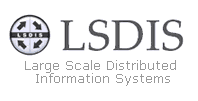 |
Semantic Web In Use Track
Accepted Papers:
| From Legacy Relational Databases to the Semantic Web: an In-Use Application for Traditional Chinese Medicine |
Chunyin Zhou, Yimin Wang, Heng Wang, Jinmin Tang, Zhaohui Wu, Ainin Yin, Huajun Chen, Yuxin Mao, Meng Cui |
| Enabling an Onlince Community for Sharing Oral Medicine Cases Using Semantice Web Technologies |
Marie Gustafsson, Göran Falkman, Fredrik Lindahl, Olof Torgersson |
| Semantic Desktop 2.0: The Gnowsis Experience |
Leo Sauermann, Gunnar Aastrand Grimnes, Malte Kiesel, Christiaan Fluit, Dominik Heim, Danish Nadeem, Benjamin Horak, Andreas Dengel |
| Explaining Conclusions from Diverse Knowledge Sources |
J William Murdock, Deborah McGuinness, Paulo Pinheiro da Silva, Chris Welty, David Ferrucci |
| OntoWiki - A Tool for Social, Semantic Collaboration |
Sören Auer, Thomas Riechert, Sebastian Dietzold |
| NEWS: bringing Semantic Web Technologies into News Agencies |
Jose M. Blazquez, Zohar Ben-Asher, Luis Sanchez, Norberto Fernandez, Michael Sintek, Ansgar Bernardi, Jesus A. Fisteus, Angelo Marrara, Manuel Fuentes |
| Ontogator --- A Semantic View-Based Search Engine Service for Web Applications |
Eetu Mäkelä, Eero Hyvönen, Samppa Saarela |
| Active Semantic Electronic Medical Record |
Nicole Oldham, Amit Sheth, Subodh Agrawal, Jonathan Lathem, Harry Wingate, Prem Yadav, Kelly Gallagher |
| Semantically-Enabled Large-Scale Science Data Repositories |
Peter Fox, Deborah McGuinness |
| Towards Semantic Interoperability in a Clinical Trials Management System |
Ravi Shankar, Susana Martins, Martin O, David Parrish, Amar Das |
| A Mixed Initiative Semantic Web Framework for Process Composition |
Jinghai Rao, Dimitar Dimitrov, Paul Hofmann, Norman Sadeh |
| Construction and Use of Role-ontology for Task-based Service Navigation System |
Yusuke Fukazawa, Takefumi Naganuma, Kunihiro Fujii, Shoji Kurakake |
| Semantic web technology for expert knowledge sharing and discovery |
Steven Kraines, Weisen Guo, Brian Kemper, Yutaka Nakamura |
| Information Integration via an End-to-End Distributed Semantic Web System |
Dimitre Dimitrov, Jeff Heflin, Abir Qasem, Nanbor Wang |
Semantic Web In Use Track
Semantic Web research has led to advances in technology which
are beginning to be deployed in ways providing real benefits
to end users. Companies are accessing and using information more
efficiently, government departments are interacting with each
other more effectively, and e-scientists are making new discoveries.
The Semantic Web In-Use Track (called Industrial Track in previous
ISWC conferences) is a showcase for:
(i) the best applications of semantic web technology and the benefits
they bring
(ii) the best tools to ease the deployment of such applications.
The Semantic Web In Use track of ISWC2006 solicits the submission
of original, principled papers dealing with applications or tools.
An applications paper should include some or all of:
- A good clear description of an implemented application of
semantic web technology. Applications are welcome in any area
- industry, government, science or society.
- An assessment of the pros and cons of using semantic web
technology to solve this particular problem. Are extensions
beyond the existing standards necessary? What advantages does
a semantic web approach have over traditional approaches to
the application?
- An assessment of the benefits of this application - e.g.
a user study, a return-on-investment analysis, demonstration
of new results in e-science, or demonstration of user acceptance.
- Evidence and assessment of deployment and use of the application.
A tools paper will include some or all of:
- A good clear description of an implemented toolset to support
the deployment of semantic web technology.
- A demonstration that the toolset offers functionality beyond
what is previously available.
- An assessment of the benefits of the toolset to the user
community - e.g. a usability study.
- Evidence and assessment of the toolset being used in the
deployment of semantic web systems
An additional objective of the track is to attract papers that
describe concrete problems in industry, government, science and
society for which Semantic Web technology would provide a solution.
Such papers should analyze the problem and argue for the appropriateness
of Semantic Web technology, and provide an outline of possible
solutions. A comparison to competing approaches using conventional
technology is strongly encouraged.
Paper submissions must be formatted in the style of the Springer
Publications format for Lecture Notes in Computer Science (LNCS).
For complete details, see Springer's
Author Instructions. Submit papers at the Conference
Submission Page.
Papers must be submitted in PDF (Adobe's Portable Document Format)
format. Papers will not be accepted in any other format. Formatted
papers must be no longer than 14 pages. Papers that exceed this
limit will be rejected without review. ISWC2006 will not accept
papers that, at the time of submission, are under review for
or have already been published in or accepted for publication
in a journal or another conference. Authors of accepted papers
will be required to provide semantic annotations for the abstract
of their submission for the Semantic Web (help will be provided
for this task). Details will be provided on the conference Web
page at the time of acceptance

Important Dates
- May 22, 2006 (11:59pm Hawaii time): Paper submissions due
- July 26, 2006: Paper acceptance notification
- August 25, 2006: Camera-ready papers due
- November 5–9, 2006: ISWC 2006 Technical Program

Copyright forms are required for all accepted papers
are are due August 25, 2006. Forms can be downloaded from [here].
Please send via fax or post to:
Attn: Jennifer Golbeck
MIND Lab
8400 Baltimore Ave, Suite 200
College Park, MD 20740
1.301.314.9734
|
|
|
 |
|

|
|
Gold Sponsors |
|
|
Silver Sponsors |
|
Doctoral Consortium Sponsors
|
|
|
|
|
 |

